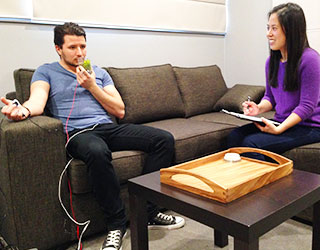Behavioural Science Laboratory Research opportunities - Department of Psychology
Become a BSL member
 Undergraduate Research Opportunities
Undergraduate Research Opportunities
Are you considering obtaining a postgraduate degree? If yes, getting significant research experience is critical for the success of your application, especially if your end goal is a PhD. Additionally, getting involved in research early will help you to figure out if you really want a career devoted to conducting research. I follow a US-based training model, in which I encourage undergraduates to get involved in research before the Honours year. As such, highly motivated and dedicated undergraduate students are welcome to become part of the Behavioural Science Laboratory. Research internships are offered during the third year. They provide the opportunity to work on at least one study, with the aim of helping the intern develop an idea for an outstanding Honours thesis to be conducted during the fourth year. Additionally, these research internships provide a chance to network and collaborate with other students with similar interests.
Postgraduate Research Opportunities
This lab focuses on translating research using animal models to human laboratory-based models. Specifically, this lab aims to understand if animal conditioning and extinction research applies to humans as currently there is a gap between pre-clinical models and real-world human applications. We are interested in how humans learn to fear once neutral objects and how to extinguish that learned fear. Likewise, we also are interested in how humans learn to use psychoactive substances and how to extinguish such behaviour. In order to meet these aims, this laboratory examines the effect of context using rooms specifically created for this purpose in the world-first Simulation Hub. The Simulation Hub provides a wonderful opportunity to gather necessary data for improving current exposure based treatments for both anxiety and substance use. The Simulation Hub also provides an opportunity for studying drinking problems in a real-life context. If you are interested in learning how to apply animal models to real-life clinical problems, then this lab will be a great fit for your mRes training or PhD. If you are looking for a small-scale project to fit the Clinical Master’s degree training, then you may be able to help out an Honours or PhD student and use some of their data for your own project.
Unsure whether the BSL is right for you? Contact a current student to hear their perspective.
Interested in joining the BSL? Contact Dr Melissa Norberg if you are interesting in joining the BSL.
.
